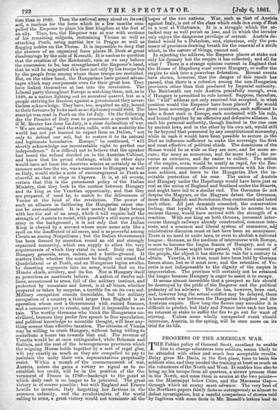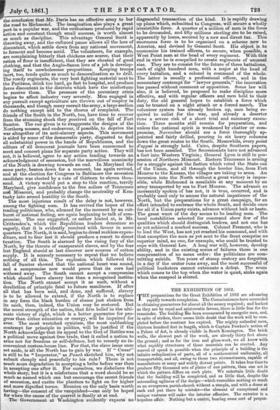PROGRESS OF THE AMERICAN WAR, T HE Fabian policy of General
Scott, excellent to enable him to change volunteers into soldiers, seems likely to be attended with other and much less acceptable results. Delay gives Mr. Davis, in the first place, time to train his soldiers also, and they needed the training at least as much as the volunteers of the North and West. It enables him also to bring up his troops from all quarters, a slower process than in the North, and mass them in armies at the two points— on the Mississippi below Cairo, and the Manassas Gap— through which an enemy must advance. The very best of the Northern papers falsify facts so outrageously as almost to defeat investigation, but a careful comparison of stories told by fugitives with some facts in Mr. Russell's letters lead to the conclusion that Mr. Davis has an effective army to bar the road to Richmond. The imagination also plays a great part in a popular war, and the enthusiasm produced by rapid action and constant though small success, is worth almost as much as discipline. This advantage General Scott is throwing away, and the enforced pause allows all the lees of discontent, which settle down from any national movement, to ferment and become acrid. The volunteers, for example, are complaining bitterly that chickens are scarce, that their ration of flour is insufficient, that they are cheated of good clothing, and that the Anglo-Saxon love of a job is develop- ing itself to unwholesome proportions. Keeping troops inert, too tends quite as much to demoralization as to The rowdy regiments, the very best fighting material next to the Puritans, drink too hard, go fast to hospital, and produce fierce discontent in the districts which have the misfortune to receive them. The pressure of the pecuniary crisis begins to affect industry very severely. Men engaged in any pursuit except agriculture are thrown out of employ in thousands, and though many recruit the army, a large section do nothing except add to the chorus of complaint. The friends of the South in the North, too, have time to recover from the stunning shock they received on the fall of Fort Sumter. The cue given is to exaggerate the designs of the Norther g masses, and endeavour, if possible, to deprive the war altogether of its anti-slavery aspects. This movement is aided by some of the democratic party, disgusted to find all substantial power in the hands of Republicans, and the editors of all democrat journals have been summoned to meet and concert plans for separate party action. They will not, it is believed, agree to any action tending towards an acknowledgment of secession, but the marvellous unanimity of the North is drawing towards an end. In Maryland the same party, beaten down for a moment, has again revived, and at the election for Congress in Baltimore the secession candidate was elected by a vote of thirteen to eleven thou- sand. A victory would put a stop to this reaction, terrify Maryland, give confidence to the free Boilers of Tennessee anti Missouri, and probably change the neutrality of Ken- tucky into armed hostility to the South. The most injurious result of the delay is not, however, among the fighting men. It has revived the hopes of the trading politicians who, silenced for the moment by an out- burst of national feeling, are again beginning to talk of com- promise. The one suggested, or rather hinted at, is Mr. Crittenden's, which the Republican leaders denounce so eagerly, that it is evidently received with favour in some quarters. The North, it is said, begins to dread reckless expen- diture, and to fear lest it should produce a resort to direct taxation. The South is alarmed by the rising fury of the North, by the threats of exasperated slaves, and by the fear lest England should at last discover new sources of cotton supply. It is scarcely necessary to repeat that we believe nothing of all this. The explosion which followed the fall of Sumter showed that the national heart was sound, and a compromise now would prove that its core had withered away. The South cannot accept a compromise which should leave slavery less than a recognized institu- tion. The North cannot accept it as such, without a dereliction of principle fatal to future manliness. If after all that has been said, and done, and suffered, slavery is to be allowed to extend, if the North is to replace in any form the black burden of shame just shaken from its neck, then, indeed, the Union may be restored. But the moral strength of the nation, that firm belief in the ulti- mate victory of right, which is a better guarantee for pro- gress than either education or energy, will be impaired for ever. The most wretched cynicism the most unblushing contempt for principle in politics, Will be justified if the North acknowledge that its appeal to the God of Battles was a political move against free trade, that it called a nation to arms not for freedom or self-defence, but to remedy an in- convenient custom-house line. For that, the slave issue once set aside, is all the North has to gain by war. If " Cwsar" is still to be " Imperator," as Punch sketched him, why not submit cheaply and peacefully to his rule ? There is not much more degradation in accepting a bribe before war than in accepting one after it. For ourselves, we disbelieve the whole story, but it is a misfortune that a word should be so much as named which can but encourage the secret friends of secession, and excite the planters to fight on for higher and more dignified terms. Reunion on the only basis worth having—the consent of the vanquished—can only be hoped for when the cause of the quarrel is finally at at end. The Government at Washington evidently expects no disgraceful transaction of the kind. It is rapidly drawing up plans which, submitted to Congress, will secure a wholly irresistible force. A quarter of a million of men is the force to be demanded, and fifty millions sterling are to be raised, apparently by loans, secured by a new and direct tax. This enormous force is to be organized on a scheme new to America, and devised by General Scott. His object is to economize his trained officers, to secure, when possible, a West Point man at the head of every regiment. With this end in view he is compelled to create regiments of unusual size. They are to consist for the future of three battalions, each of eight hundred men, with a major at the head of every battalion, and a colonel in command of the whole. The latter is usually a professional officer, and in the momentary contempt for "lawyer generals," the innovation has passed without comment or opposition. Some law will also, it is believed, be proposed to make discipline more effective, and with regular officers and men held to their duty, the old general hopes to establish a force which can be trusted on a night attack or a forced march. The volunteer system has already broken up, men being re- quired to enlist for the war, and already a deserter runs a severe risk of a short trial and summary execu- tion. Three months still remain for preparation, and unless the national spirit is weakened by chatter or com- promise, November should see a force thoroughly ap- pointed and fairly drilled, pouring in six heavy columns down the great routes to the South. Meanwhile, every point orappui is strongly held. Cairo, despite Southern papers, has not been assailed. The Secessionists have not advanced a foot into Western Virginia; General Lyon is still in pos- session of Northern Missouri. Eastern Tennessee is arming for a struggle against the faction which voted the State out of the Union, and all through the border line, from Fort Monroe to the Kansas, the villages are taking to arms. An incursion into the North without a great victory is impos- sible, while Richmond is assailable at any moment by an army transported by sea to Fort Monroe. The advance so incessantly spoken of has not, it is true, occurred, and is probably used only to amuse the natural impatience of the North, but the preparations for a great campaign, for an effort intended to embrace the whole South, and decide once for all if a Union party exists, advance without halt or haste. The great want of the day seems to be leading men. The local notabilities selected for command show few of the qualities which should distinguish leaders, and not one has as yet achieved a marked success. Colonel Fremont, who is to lead the West, has not yet reached his command, and with that exception the men as yet sent to the front comprise no superior mind, no one, for example, who could be trusted to cope with General Lee. A long war will, however, develop ability, and in the existing series of failures there is one compensation of no mean order: the politicians are com- mitting suicide. Ten years of stamp oratory are forgotten in a day if the orator runs away, and the most successful of political hucksters cannot extenuate a defeat. The scam which comes to the top when the water is quiet, sinks again when the cesspool is stirred.































 Previous page
Previous page